 |
 |
|
 |
|
 |
|  |
|  |
|
 |
|
 |
|  |
|  |
|
 |
Recently I've been playing with Gilles Tran's cloud generation technique (to
whit: creating .dxf files from slices of monochrome pigments using an
animation loop, and then using the .dxf file to define a media density -
see http://www.oyonale.com/ressources/english/sources13.htm). I decided not
to use his actual MakeCloud macro; I thought I'd do it from scratch to learn
the ropes properly.
This image is my most recent effort. Getting the media settings right didn't
take too long, but I did have some difficulty balancing the solidity of the
cloud with its opacity. This sounds like the same thing, but I found that
the only way to make a cloud really opaque was to up the absorption. This
made the shadowed areas really dark (more like heavy smoke), when in
reality clouds tend to exhibit a kind of translucency. Adding a small
amount of emission cured this problem nicely.
More difficult is the shape. I think I've nailed the flat undersides that
typify low-level heavy clouds, but getting the rest of it to look suitably
'billowy' at the same time is quite tricky. I've settled on using an
isosurface to define the pigment (I find the shapes are easier to control);
this cloud is a small-scale granite added to a larger-scale bozo added to
tall hemisphere on top of an inverted flattened hemisphere (the latter
provides the flat underside).
Comments / suggestions for other refining the shape, anyone?
Bill
Post a reply to this message
Attachments:
Download 'cloud1.jpg' (52 KB)
Preview of image 'cloud1.jpg'
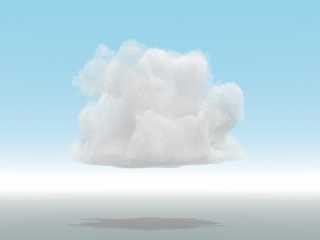
|
 |
|  |
|  |
|
 |
|
 |
|  |
|  |
|
 |
Here we go, a mini-cloudscape. A very worthwhile experiment, methinks. Now
all I need is a scene to go with it. :)
This rendered in 15 minutes on an ageing 900MHz Win98 system, peak memory
usage a mere 28MB. The media settings are quite low quality - 1 interval
and default sampling - so I imagine higher-quality settings could take over
an hour...
Bill
Post a reply to this message
Attachments:
Download 'cloud2.jpg' (64 KB)
Preview of image 'cloud2.jpg'
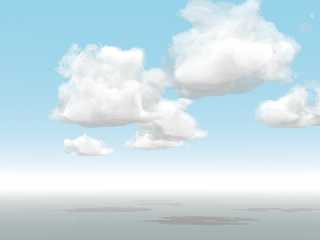
|
 |
|  |
|  |
|
 |
|
 |
|  |
|  |
|
 |
Nice work Bill. It reminds me of my own attempts at clouds (see
attached picture). I used the f_torus_gumdrop function to get the flat
base. I moved the bounding box so the torus and opposite gumdrop were
cropped out though
(http://www.econym.demon.co.uk/isotut/builtin3.htm#tg). I believe I
used bozo on top as well with just some turbulence, its been awhile.
Your attempts are significantly better though thanks to the speed
increases. I rendered it as an isosurface with a scattering media
density and I believe it took several hours on my 450 MHz. I was also
running into the transparency issues with overlapping media containers.
Anyway, the shape works fairly well for cumulus mediocris and cumulus
humilis. The bozo pattern doesn't really hold up on the taller forms of
cumulus and cumulonimbus. You need to be able to model a cauliflower
type shape and I'm still scratching my head on that one. I thought
about starting with a base shape like the gumdrop or hemisphere and
tracing spheres of decreasing of radius on top of it, but haven't gotten
around to actually playing with it.
Skip
Bill Pragnell wrote:
> Recently I've been playing with Gilles Tran's cloud generation technique (to
> whit: creating .dxf files from slices of monochrome pigments using an
> animation loop, and then using the .dxf file to define a media density -
> see http://www.oyonale.com/ressources/english/sources13.htm). I decided not
> to use his actual MakeCloud macro; I thought I'd do it from scratch to learn
> the ropes properly.
>
> This image is my most recent effort. Getting the media settings right didn't
> take too long, but I did have some difficulty balancing the solidity of the
> cloud with its opacity. This sounds like the same thing, but I found that
> the only way to make a cloud really opaque was to up the absorption. This
> made the shadowed areas really dark (more like heavy smoke), when in
> reality clouds tend to exhibit a kind of translucency. Adding a small
> amount of emission cured this problem nicely.
>
> More difficult is the shape. I think I've nailed the flat undersides that
> typify low-level heavy clouds, but getting the rest of it to look suitably
> 'billowy' at the same time is quite tricky. I've settled on using an
> isosurface to define the pigment (I find the shapes are easier to control);
> this cloud is a small-scale granite added to a larger-scale bozo added to
> tall hemisphere on top of an inverted flattened hemisphere (the latter
> provides the flat underside).
>
> Comments / suggestions for other refining the shape, anyone?
>
> Bill
>
>
> ------------------------------------------------------------------------
>
Post a reply to this message
Attachments:
Download 'cloud test 16.jpg' (20 KB)
Preview of image 'cloud test 16.jpg'
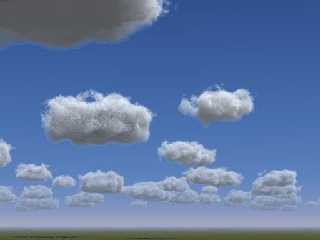
|
 |
|  |
|  |
|
 |
|
 |
|  |
|  |
|
 |
That's very nice work Bill, but to me, it has a 'painted' look to it at the
moment. And if I say painted, I mean in almost professional terms. (As if
I'm qualified!) ;)
I think you're close to something good here. Keep at it.
~Steve~
Post a reply to this message
|
 |
|  |
|  |
|
 |
|
 |
|  |
|  |
|
 |
Hi Bill,
could you post your media settings? I might have a scene to go with your
clouds ;-)
Thanks
Joanne
http://www.onewhiteraven.com
Post a reply to this message
|
 |
|  |
|  |
|
 |
|
 |
|  |
|  |
|
 |
Nice work, Bill!
You are on the right track. Still a bit *cotton*-like I believe, not
entirely cloud-like. How is the overlapping container issue behaving?
Gilles' macro suffers from that unfortunately.
Thomas
Post a reply to this message
|
 |
|  |
|  |
|
 |
|
 |
|  |
|  |
|
 |
Hi there.
I recently worked on the question of clouds, and I found that one should
separate cloud layers from individual clouds. I developed macros and
template files in order to control atmposphere effects, cloud layers,
individual clouds, redenning of light when the sun is low above the
horizon.
One thing is sure: if you want nice clouds, it takes long to render because
you need to increase the number of samples. You also must tune the ratio
scatter/absorb, chose the scattering type (MIE_HAZY_SCATTERING seem OK),or
maybe combine 2 scattering types. But I would not recomment adjusting the
aspect via emission. First because it does not correspod to reality, and
second because it will interact with radiosity in a wrong manner.
Here is my last result. I post right after some other samples of what I got
so far. These are 800x600 renders with 2/3 of them is sky. They took 2-3
hours ach with an athlon XP 3000+.
Btw: can I attach more than one image in a post?
Now I am working on some other features: sun aspect (halo ...)
Post a reply to this message
Attachments:
Download 'sample_28.jpg' (21 KB)
Preview of image 'sample_28.jpg'
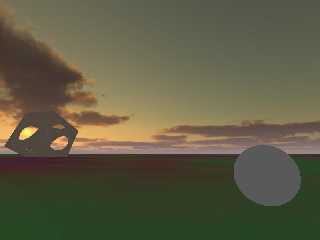
|
 |
|  |
|  |
|
 |
|
 |
|  |
|  |
|
 |
Skip Talbot <Ski### [at] aol com> wrote:
> It reminds me of my own attempts at clouds (see
> attached picture).
Nice. They all appear to be very similar in shape, however. I take it the
only parameter being varied from cloud to cloud in your image was the bozo
translation, or similar?
> Your attempts are significantly better though thanks to the speed
> increases.
Gilles mentions on his site that this method is fast, presumably because the
density function is precalculated, but I was surprised at just how fast it
is. These clouds aren't very high-res dxf files, of course - 320x240x120
voxels - but the effect is all the more impressive because you just can't
tell.
> The bozo pattern doesn't really hold up on the taller forms of
> cumulus and cumulonimbus.
True. I find that using a granite pattern instead of turbulence works well -
granite can produce the 'lumpy' appearance of clouds under the right
circumstances.
> You need to be able to model a cauliflower
> type shape and I'm still scratching my head on that one. I thought
> about starting with a base shape like the gumdrop or hemisphere and
> tracing spheres of decreasing of radius on top of it, but haven't gotten
> around to actually playing with it.
Building a recursive merge of spheres and filling it with media sounds slow
to me... however, using such an object to define a pigment and hence a dxf
file would be much faster. Worth a try, at least.
I shall play more...
Bill com> wrote:
> It reminds me of my own attempts at clouds (see
> attached picture).
Nice. They all appear to be very similar in shape, however. I take it the
only parameter being varied from cloud to cloud in your image was the bozo
translation, or similar?
> Your attempts are significantly better though thanks to the speed
> increases.
Gilles mentions on his site that this method is fast, presumably because the
density function is precalculated, but I was surprised at just how fast it
is. These clouds aren't very high-res dxf files, of course - 320x240x120
voxels - but the effect is all the more impressive because you just can't
tell.
> The bozo pattern doesn't really hold up on the taller forms of
> cumulus and cumulonimbus.
True. I find that using a granite pattern instead of turbulence works well -
granite can produce the 'lumpy' appearance of clouds under the right
circumstances.
> You need to be able to model a cauliflower
> type shape and I'm still scratching my head on that one. I thought
> about starting with a base shape like the gumdrop or hemisphere and
> tracing spheres of decreasing of radius on top of it, but haven't gotten
> around to actually playing with it.
Building a recursive merge of spheres and filling it with media sounds slow
to me... however, using such an object to define a pigment and hence a dxf
file would be much faster. Worth a try, at least.
I shall play more...
Bill
Post a reply to this message
|
 |
|  |
|  |
|
 |
|
 |
|  |
|  |
|
 |
Here is the zip with the samples of cloudscapes.
Regards.
Post a reply to this message
Attachments:
Download 'samples.zip' (187 KB)
|
 |
|  |
|  |
|
 |
|
 |
|  |
|  |
|
 |
This one is the same as the previous one, but with day light.
Post a reply to this message
Attachments:
Download 'sample_29.jpg' (26 KB)
Preview of image 'sample_29.jpg'
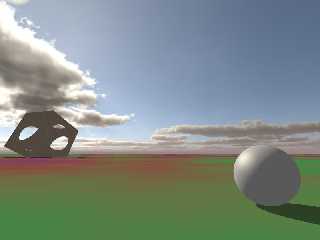
|
 |
|  |
|  |
|
 |
|
 |
|  |




![]()